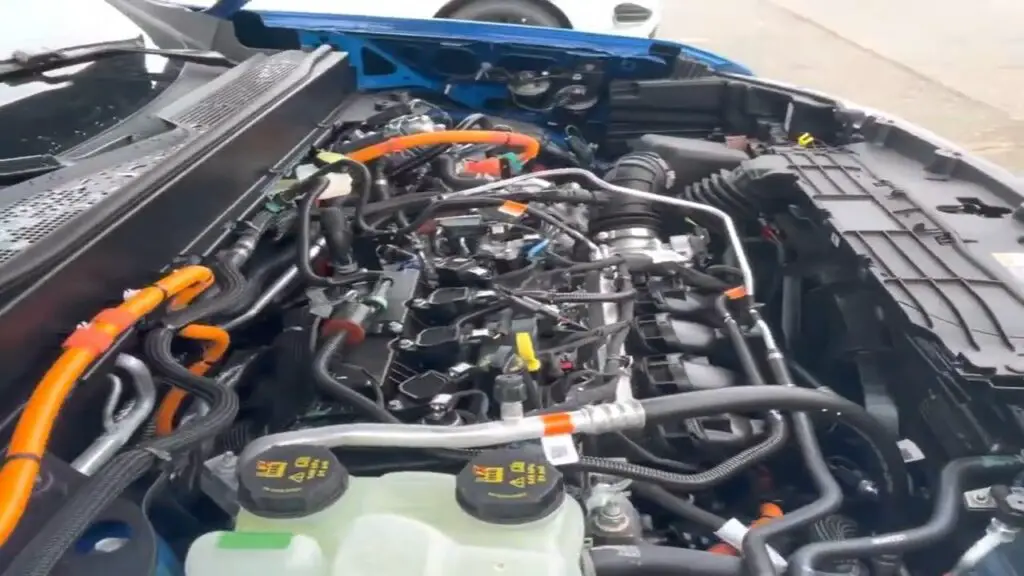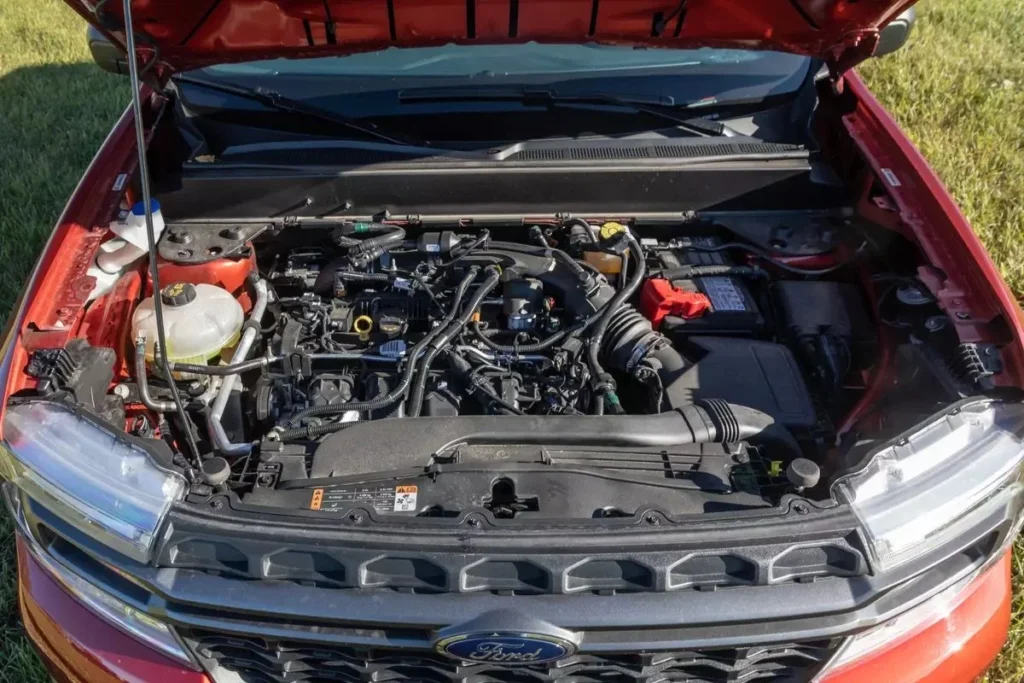Ford Maverick engine problems can range from issues like engine misfires, low battery detection, turbocharger failures, and cylinder misfires in hybrid models.
The Ford Maverick, a compact pickup truck introduced in 2022, has quickly gained attention for its affordability, versatility, and efficiency. Built with a modern hybrid engine and a turbocharged 2.0L EcoBoost option, it has become a popular choice among drivers looking for a more economical and practical vehicle. However, like any vehicle, the Ford Maverick is not without its share of engine-related issues. While these problems are not widespread, they can significantly affect the performance and longevity of the vehicle if left unchecked.
In this in-depth guide, we will explain the most common Ford Maverick engine problems, provide solutions, and offer maintenance tips to help you avoid potential issues.

Contents
- 1 Common Ford Maverick Engine Problems
- 2 Maintenance Tips to Prevent Engine Problems
- 3 Frequently Asked Questions
- 4 Conclusion
Common Ford Maverick Engine Problems
The Ford Maverick has garnered attention for its reliability and fuel efficiency, but like any vehicle, it comes with its own set of engine issues. Below, we’ll explore the most common engine problems faced by Ford Maverick owners, along with their symptoms and recommended solutions.
Engine Fire Recall
One of the most significant issues that have surfaced with the Ford Maverick is the engine fire recall. Some Ford Maverick models have been affected by a defect that may cause engine fires. The problem, which involves a fuel line that can rub against a plastic engine cover, may cause a leak and result in a fire. Ford has issued a recall for affected vehicles to inspect and repair the engine. Owners of impacted vehicles will be notified, and repairs will be made free of charge.
Symptoms of Engine Fire Risk:
- Gasoline smell coming from the engine compartment
- Engine overheating or excessively high temperature readings
- Visible leaks or puddles of fuel under the vehicle
How to Fix:
- If your vehicle is affected by this recall, contact your local Ford dealership to have it inspected and repaired.
- Keep a close eye on any warning lights or unusual smells from the engine that could indicate a fire risk.
Cylinder Misfires in Hybrid Models
Some Ford Maverick Hybrid models have reported experiencing cylinder misfires, leading to poor engine performance. This issue is particularly concerning for owners who expect a smooth, efficient driving experience from their hybrid truck. Symptoms include rough idling, engine stalling, or hesitation during acceleration. An engine misfire could indicate issues with spark plugs, ignition coils, or fuel injectors, and may be more common in vehicles with higher mileage.
Symptoms of Cylinder Misfire:
- Rough engine idle
- Loss of acceleration or hesitation
- Flashing check engine light
- Decreased fuel efficiency
How to Fix:
- Check for fault codes using an OBD-II scanner to determine the specific cylinder that is misfiring.
- Replace faulty spark plugs, ignition coils, or fuel injectors as necessary.
- Ensure the air intake and fuel system are clean and functioning properly to avoid further misfires.
Low Battery Detection Leading to Power Loss
Another significant issue faced by Ford Maverick owners is low battery detection, which can lead to a loss of power during driving. This issue has been observed in models manufactured with a faulty battery detection system. This could lead to a situation where the vehicle unexpectedly loses power, leaving the driver stranded or causing sudden stalling on the road. This problem is particularly prevalent in hybrid models where the vehicle relies on both the electric motor and gasoline engine for power.
Symptoms of Power Loss:
- Sudden engine power loss while driving
- Warning lights indicating low battery
- Difficulty starting the vehicle
How to Fix:
- If your Maverick is affected by this issue, check the battery connections and ensure they are clean and secure.
- If the battery is faulty, replacing it with a new one may resolve the issue.
- If you suspect that the problem is with the powertrain control module, contact your local Ford dealership for a software update or recalibration.
Turbocharger and Exhaust Manifold Issues
The Ford Maverick with the 2.0L EcoBoost engine has also been reported to experience issues with the turbocharger and exhaust manifold. These components can wear out over time, causing reduced engine performance and potentially leading to costly repairs.
A faulty turbocharger may result in a loss of power, poor acceleration, and black smoke from the exhaust, while an issue with the exhaust manifold may cause engine misfires, knocking sounds, or an increase in engine temperature.
Symptoms of Turbocharger and Exhaust Manifold Problems:
- Loss of power or sluggish acceleration
- Increased exhaust smoke or unusual engine sounds
- Higher than normal engine temperatures
How to Fix:
- Inspect the turbocharger and exhaust manifold for signs of wear, cracks, or leaks.
- Replace damaged components such as the turbocharger, exhaust manifold, or gaskets as needed.
- Regularly check and replace engine oil to keep the turbocharger lubricated and prevent excessive wear.
Carbon Buildup in Intake Valves
Due to the lack of direct port fuel injection in some of the Ford Maverick engines, carbon buildup on the intake valves has become a common issue. Carbon buildup occurs when fuel does not wash over the intake valves, leaving deposits that gradually reduce engine performance. Over time, this buildup can lead to engine misfires, rough idling, and decreased fuel efficiency.
Symptoms of Carbon Buildup:
- Rough idling or engine stalling
- Decreased engine power or acceleration
- Reduced fuel efficiency
How to Fix:
- Regular maintenance, including walnut blasting or other cleaning methods, can help remove carbon buildup.
- In severe cases, the intake valves may need to be removed and cleaned manually by a professional mechanic.
- Using high-quality fuel can help reduce the likelihood of carbon buildup over time.

Maintenance Tips to Prevent Engine Problems
Preventing engine problems in your Ford Maverick is essential for maintaining optimal performance and longevity. Here are a few maintenance tips:
- Regular Oil Changes: Keep your engine lubricated by changing the oil at the recommended intervals to prevent wear and tear.
- Inspect and Replace Air Filters: Clean air filters ensure the engine gets the proper amount of air, preventing carbon buildup.
- Battery Maintenance: Regularly check the battery and charging system to avoid power loss issues.
- Engine Diagnostics: Use diagnostic tools to detect early signs of engine problems, such as misfires or electrical malfunctions.
- Check for Leaks: Always inspect for oil, coolant, or fuel leaks to avoid bigger engine problems later on.
Frequently Asked Questions
Here are some FAQs about Ford Maverick engine problems –
1. Why is my Ford Maverick losing power suddenly?
A sudden loss of power in your Maverick can be due to a low battery issue, turbocharger failure, or a fuel system problem. It’s best to run diagnostics to pinpoint the cause.
2. What’s the average lifespan of a Ford Maverick engine?
With regular maintenance, the Ford Maverick engine can last upwards of 200,000 miles. However, issues like misfires and overheating can shorten its lifespan if left unaddressed.
3. Is the Ford Maverick hybrid engine more prone to problems?
While the hybrid engine provides excellent fuel efficiency, it can be prone to issues like misfires or battery-related problems. Regular maintenance is key to avoiding these issues.
Conclusion
The Ford Maverick is a great choice for drivers seeking an affordable and efficient pickup truck. However, like any vehicle, it comes with its own set of engine-related challenges. By staying informed about common issues such as engine fire recalls, cylinder misfires, low battery detection, turbocharger problems, and carbon buildup, you can take the necessary steps to maintain your truck.